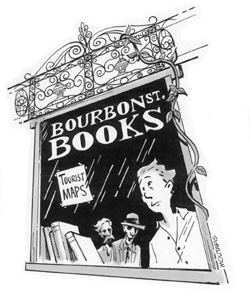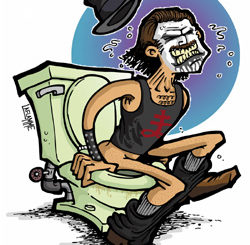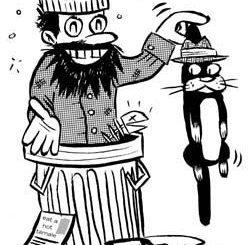 Immortal Combat
Immortal Combat
by Kerry Joyce
illustration by Greg Moutafis
I married a pagan. I’ve got the photos to prove it. It was a genuine all-day panorama. The only detail partially overlooked was the music. The nicest thing I can say about “Skip” is that, as a DJ, he was one hell of a former varsity all-star something or other. I’m very sorry we dragged him away from his Soloflexing, even for a few hours, and in my better moments, I really don’t hope he chokes on a cubic liter of reconstituted apricot pulp.
Come to find out, there are an infinite number of details involved in planning a wedding, and what can you expect when you marry a pagan? – a more or less sentient being for whom the world as it appears to the eye takes priority over that of the ear, and other more evolved sensibilities, the kind of gal who interviews four florists before making a selection, but runs off with the first DJ she spots in the background of a complete stranger’s wedding video. With Laura, the world is definitely organized around sight first, sound second. And as for the revealed truth of the word, well, that comes in a distant third. And it had better be punctuated properly, thank you very much. (See Masthead)
After the wedding, we left Massachusetts, land of the Puritans, of Unitarianism, and the birthplace of Franklin and Adams, Emerson and Thoreau, Dickenson, Hawthorne, Cummings, and numerous other members of the unkempt pantheon hailing from this old hub of printed-page fetishism, and headed down South, down below sea level, down to the primal depths, for a honeymoon in the teetering pagan stronghold of New Orleans.
It is a city where, until the beginning of this century, the landed aristocracy languidly spoke French. A city where the patriotic citizens willingly gave over their sons as cannon fodder for the Civil War, yet unlike other Southerners, steadfastly refused to hand over their delicately-crafted wrought-iron gateways and hand railings for smelting into cannon balls in that same struggle. A city that in 1850 boasted both the highest income and the highest death rate of any in America. A city where the teeming dead were and still are interred above ground because the shifting, rain-soaked ground below tends to discharge them like loose stools into the ever-flooding alleys and streets. A city in a state so historically Catholic the counties are called “parishes,” and where the income gap between rich and poor would make an Argentinean blush, the highest of any state in our somewhat reconstructed Union. It’s the city of Mardi Gras, and Voodoo central. And with the devil rhythms of blues and jazz thrown in, it was, for over a century, the city where a Black man or woman had the best little hope of living life on a grand scale.
Now I ask you friends, North of the Rio Grande and aside from a handful of festival days in a couple of Chinatown’s and Little Italy’s, does it ever, on this great continent of ours, get any more pagan than that?
Ah, but the pagan jewel rests not so easily, bobbing and soaked as it is in the sea of Dixie, an empire whose netherworld is decidedly Protestant and whose carnal realm is peopled with Christians of various stripes who all agree, if on nothing else, that: A golden calf, even if it is dressed up to look like Jesus, is something you make veal out of, and Mary was God’s mother, but so what?, because as it is written in the Gospel of John: “In the beginning there was The Word and The Word was God.”
If the Protestant world cannot compromise itself by meeting the New Orleans pagan challenge saint-for-saint and statue-for-statue, it can at the very least battle it out sinner-for-sinner and word-for-word.And so it has. Most notably with imported mercenaries. It was in New Orleans that Mississippi’s William Faulkner wrote his first novel, A Soldier’s Pay. Tennessee Williams migrated here and wrote A Streetcar Named Desire and Cat On A Hot Tin Roof. Even Jack Kerouac tracked adding-machine heir turned repentant junkie, William S. Burroughs, to his writing roost in the city’s French Quarter.It would seem the pagan strain of New Orleans helps the Pilgrims from the American heartland flesh out their stories with a little local color while these same print mongers may serve in some way to keep the place from going entirely Latin, from using the annual Mardi Gras festivities as a staging area for turning the city into a year-round bacchanal.
It’s a theory, maybe only a delusion. But believing firmly in it, I strode confident into this comely, hand-crafted heart of darkness for my honeymoon getaway, knowing that somewhere in the bowels of this city, there were brethren. My brethren. People who don’t get all excited about the latest thing, who can string three sentences together in a row without saying “uh,” or “ya know.” And if they use the word “like,” it’s probably for the noble purpose of a simile. The kind of people who can describe a frustrating situation without rolling their eyes or using the word “bullshit,” who can emotionally disconnect from a compelling past experience long enough to describe it to you with dispassion, economy, and precision. In other words, people as utterly fucked up as I am.
Yes, I knew that even if no one was at that moment penning the next Nobel Prize winner somewhere in New Orleans, that it still had enough literary heritage going for it that residing there would be a not-so-motley assortment of Vestal Virgins, Swiss Guards, shock troops, infantry and marines, both active duty and reserves, manning the ramparts of past literary greatness.
The active duty troops are the bookstore clerks, the English professors and their grad students. The reserves are mostly made up of people like me. Those with an abiding faith in what was once a reality, but is now more of a fanciful idea:
The great American novel.
And more importantly, the great American novelist. The idea of it… well, it doesn’t exactly stoke the embers of my feverish brain, but then what does these days? At this point, I’d say it soothes and comforts like a warm sitz bath.
Just the miraculous fantasy of it. That by typing a hundred thousand words on a single story with a more or less made up beginning, middle, and end, that this feat, if managed properly, earns you not only lots of cash but the right, nay the obligation, to quietly exit a Paris Hotel room while indifferently blowing off some random, generic, overwrought, underfed supermodel as she sobs quietly on the floor by the antique marble fireplace with a line like:
“You shouldn’t have skimmed over the intro baby, I said I was just like all the rest. In fact, I bragged about it.”
And as this sets her to really blubbering, you comfort her with: “You think this is tragedy? Check me out Wednesday on C-SPAN during my live-feed from Rwanda.”
Then you peck her on the cheek and grab the next flight (first class) over to Bosnia for some more heartbreak you can pimp off on the earnestly literate masses tuning into your interview on NPR.
No, I haven’t exactly written a novel. Not even close. But the idea that I might has provided a convenient excuse for avoiding all sorts of adult unpleasantry.
“No can do honey, buddy, boss. I’m saving myself for something bigger.”
Well into chronological adulthood, I’m still not ready to get started on my great American novel, but the idea that I might be someday also protects me, keeping me ever chaste from all sorts of pagan influences and spectacles: The Super Bowl, Independence Day, consumerism, tongue piercing, etc. But enough of Paris, supermodels, and grown men’s little boy dreams… Back to New Orleans where the French and their finery were considered decadent and unmanly by the English and Scots, who were in turn regarded as coarse and uncultured by the French, though certainly useful if you needed a harness mended.
With all of this cultural overload, it’s really no wonder that New Orleans sustained and relied on out-of-towners to forge this legacy. Walker Percy, another Mississippi Protestant who mined a literary name for himself with the touchstone of New Orleans, though safely from one of her suburbs, wrote: “the occupational hazards of the writer in New Orleans is a variety of the French flu. One is apt to turn fey, potter about a patio… a pleasant enough life, but for me too seductive.”
New Orleans, it seems, is an organism that in the course of its evolution has stubbornly formed its soul into an inherent contradiction, like Irish Catholics – the wordiest of people worshipping in the least wordy of all Christian sects. It’s a melodramatic little metropolis comically playing at war with itself like a neon Bible. (The Word made pagan.) Sometimes not so comically.
The Neon Bible happens to be the title of a novel by John Kennedy Toole, both a rare literary genius and a native of New Orleans, whose destiny was not “the writer’s life,” my version or his own, but instead a pagan martyr’s death. Written in his teens, The Neon Bible is the story of a young David who copes with the narrowness and pressure of growing up in a small, rural Southern Protestant town by blowing a hole in the preacher’s skull. (Take that, Walker Percy!)
He then went on to write another great American novel called A Confederacy of Dunces, which won him the Pulitzer Prize. By the time he was 22 and finishing up a hitch in the Army, Toole had written not one great American novel, but two.
The only problem was, he couldn’t get them published. So he went to grad school and taught at a local college, the subject he was an unacknowledged master of, literature.
Six years after completing Confederacy, and four years after he despaired of ever seeing it in print, Toole drove his car to Biloxi, Mississippi, put a garden hose into the exhaust pipe, and quietly took his own life.
Toole’s mother went on a kind of crusade, and after many years, with the help of none other than Walker Percy, she managed to get Confederacy published. The Neon Bible, written first, but published later, received critical acclaim, but has not enjoyed the popularity of A Confederacy of Dunces, which can be found in any mall bookstore.
In true New Orleans fashion, there is today a life-sized bronze statue of Ignatius P. Reilly, the hero of Confederacy, on Canal Street. It’s right on the sidewalk in front of what used to be the D. H. Holmes Department Store, the spot where Ignatius is nearly arrested in the opening scene of the first chapter.
It was raining and the picture I took with a disposable camera didn’t come out. Just as well, it didn’t look like the way I pictured him at all. I’m still glad it’s there, though.



